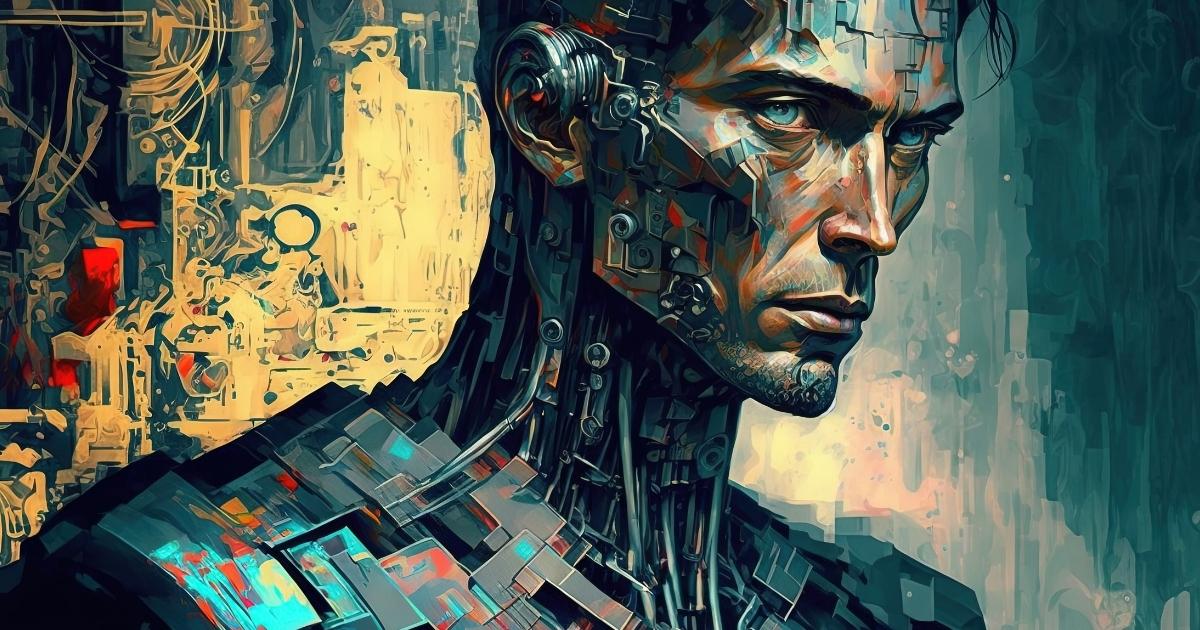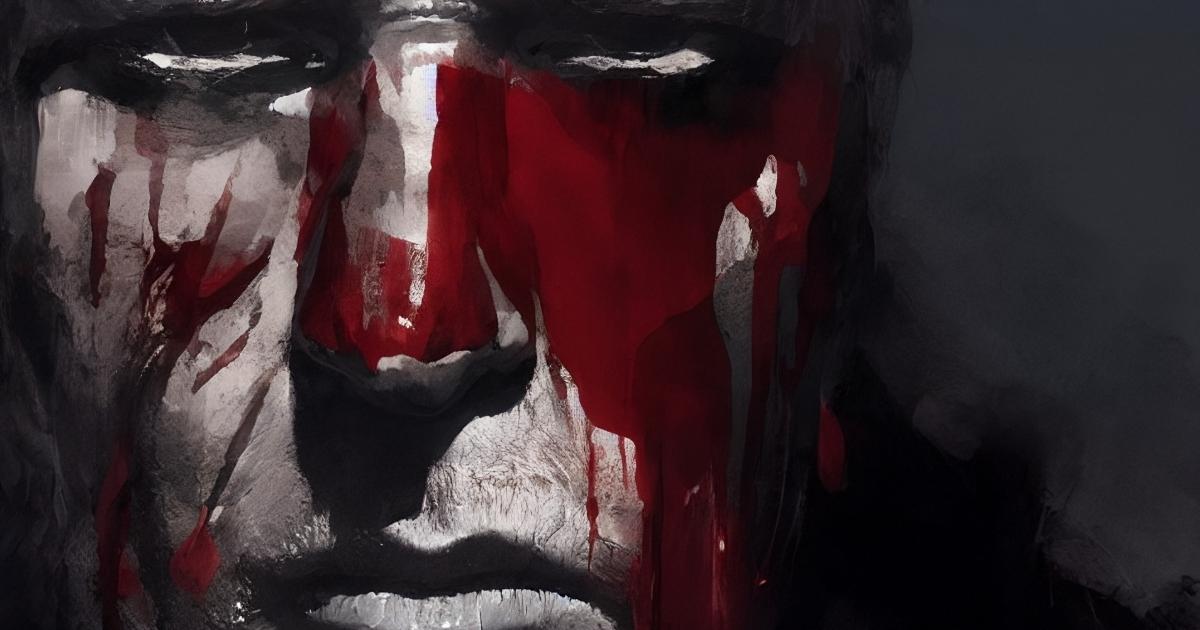

Reprint Story: Darkly Through the Glass Place
By Kirk Bueckert
Originally Published by Coffin Bell
I.
In my dream, I’m walking with Silvia through the garden. The greenhouse is humid, tropical, yet her little hand in mine is cool. The scent is that good soil, of growing things. All around us bloom orchid and lily blossoms and birds of paradise as we stroll among the tops of turnips and gourds. A ladybug scuttles from a low tree branch into Silvia’s open palm, its microscopic legs planting a thousand tiny kisses across her skin. I watch as her bewilderment becomes delight and then the dream concludes.
The collective memories of my daughter account for some three hundred terabytes—extra storage is available at a modest premium.
I wake alone in the pulsing darkness of my pod, to the sound of voices in the hall: man, woman, computer. A young married couple has rented the pod around the corner and the concierge program is giving them a tour. The previous tenant was evicted just last night when he gambled away his ticket status, a regrettably common occurrence in this tower. I wonder whether the married couple will have better luck than his. A message blinks across the glass beside me. ‘Good morning, Luke Duncan-Epsilon. The time is 0600 hours on December 7, 2023. Your day begins now.’ Behind the text, beyond the window, looms the sprawling city with its towers like stalagmites in some vast obsidian cave. In the Old Reality, the hour was determined by the sun. Within the Hive, the Warmth of Sunlight is a commodity. The darkness alone is public domain.
0900 HOURS
I patrol the Grand Market with my partner, Constable Marcus-Theta. The constable has, I notice, upgraded his avatar since last we spoke. I compliment the subtle new design. He points to one of several cosmetic salons in the distance. “Maybe some day you’ll join me, huh?” For sentimental reasons, I’ve retained most of the standard design. Like all Gold Models, it was based on a digital rendering of my physical form such as it was when I plugged into the system. I tell the constable I’ll save my money.
We move methodically among the Market patrons and the vendors advertising Tastes and Aromas reminiscent of the Old Reality. Taste of Maguro Nigiri with Ginger and Wasabi. Gyoza with Soy Sauce. Medu Vada with Sambar and Chutney. Glowing neon signs illuminate the busy plaza—a communal space so densely populated, it could never exist on the outside. Pungent smoke rises from the kiosks to tempt prospective customers. A translucent Venus reclines among the clouds as doting cherubs feed her grapes. The decadent goddess moans, “It’s Even Better Than I Remember!”
My corporeal body requires no nutrients, as it presently slumbers in cryostasis. Yet passing through the neon smoke, I’m struck with a sudden pang of hunger. Our avatars exhibit many such redundant neurological impulses. Without them, the numbness of a purely virtual existence might detach us from our humanity. I ‘hunger’ because to hunger is human. More than Taste, a variety of synthetic sensory experiences are sold as tonics, gel capsules, and inhalants. Even Touch, with all of its intricate nuance, can be purchased in the bathhouses and massage parlors of the Magenta District, just beyond the boundaries of the Market.
“Another power-cut, last night,” Marcus-Theta laments.
“I noticed,” is my response.
“I can’t remember the name of my kindergarten schoolteacher.”
“Is it important?”
“I suppose not.”
“Then don’t worry about it.” We continue along our designated route until one sign draws my glance. It glows above a spectrum of tiny gel capsules displayed in tall transparent cylinders. Taste of Ballpark Frank with Ketchup and Spicy Mustard. I nudge my partner and point. “Do you remember those? American hot dogs…”
“How much for two caps?” my partner inquires.
“No charge for policemen,” says the vendor. Walking the beat is not without its perks.
Projected onto the wall behind him is a televised political debate between two Platinum-Class ticket holders running for city council. “It’s time our municipal government crack down on the number of new citizens plugging in on a regular basis. Recent spikes have already come at the cost of widespread power cuts and threaten to overload the entire system—”
His opponent interjects, “We are talking about an unprecedented global pandemic! We have a responsibility to—” but I’ve stopped listening. I leave Hive politics to the Platinum crowd.
Still, as I receive my capsule, I notice the prices of many commodities have risen due to the cuts. Because every individual’s memory storage is part of the greater collective whole, a temporary loss of system power sometimes equals loss of memories. As cuts become increasingly frequent and remembrances (like the taste of an American hot-dog) become distorted,
the retail value rises accordingly.
“Bottoms up,” says Marcus-Theta.
I place the capsule on my tongue (a ceremonial gesture to trigger the sensory process) and suddenly I’m salivating, masticating even. I’m savoring the salty, tangy juices. I’m a young boy again in the bleachers with my brother, chanting “Let’s go, Red Sox!” under a radiant summer sun. The Taste lingers exactly one minute and thirty seconds, and then is gone. My hunger wanes.
“It’s Even Better Than I Remember!” the buxom goddess moans.
We thank the vendor and resume walking. I think of my daughter, living alone on the outside—what will her dinner be tonight? A tin of Campbell’s tomato soup? The weather must be cold out there by now.
I’ve been a part of this digital community since the very beginning. Acquiring a ticket was easier in those days when the technology was new. I still remember what reality was prior to the pandemic and the subsequent protocol restricting all human contact. Biochemists and microbiologists continue to labor, still unable to synthesize a cure. Nothing has proven capable of combating this disease, which had incubated for untold millennia within the now-melted polar ice caps. Until that changes, the choice is either to live alone in the real world, isolated inside of a plastic bubble, or here within this new virtual archology, together.
Silvia’s mother, Teresa, was immunocompromised and among the thousands claimed by the pandemic just last winter. I had begged Teresa to let me bring them into the Hive. Alas, even on her deathbed, that stubborn woman I once loved was convinced a cure was imminent, convinced a miracle would save her, save all of us. I don’t believe in miracles, and ever since her death I’ve been on a list, waiting to purchase a second Gold-Class ticket. Meanwhile, Silvia wanders the Quarantine Zone in her hazmat suit, scavenging what remains of our abandoned metropolis. The military maintains order, but as resources dwindle and the death toll rises, I begin to wonder for how long order will last. For a time, we would exchange video messages. Our last correspondence ended in an argument, the subject of which I’m unable to recall. I was never much of a father in the Old Reality. Within the Hive, things could be better. Together, we could begin anew.
II.
In my dream, I walk with Silvia through the garden. The greenhouse is warm, but her hand is cool. The scent is that of growing things: blossoms, vegetables. A ladybug crawls into her hand. This amuses her.
DECEMBER 16
My partner and I have been reassigned.
A wanted hacker has recently gained access to the system and is living among us, disguised as an ordinary citizen. As of 0900 hours, a surveillance team intercepted plans to seize control of the Hive’s collective digital assets. Capturing the cyber-terrorist, codename Black Hat, is now priority number one.
“Long has this criminal eluded outside authorities,” the Superintendent says, “but where others have failed, our department will succeed.” The Super addresses me directly now. “You have a child currently waiting to be plugged in, is that correct?”
“Yes,” I tell him. “A daughter, Silvia, sir.”
“Arrest this man, Inspector, and I will personally see to it that your daughter is given a Gold-Class ticket.”
1800 HOURS
I locate the snitch known as Church Mouse panhandling outside of the New Baptist Megachurch. Behind its doors, the minister at his pulpit equates the global health crisis to the judgment of a tyrannical god. His booming sermon in seven languages echoes out onto the street. “Hark! I will bring a sword upon you which will avenge the breaking of my covenant! And when you withdraw into your cities, I will send a pestilence, delivering you into the hands of your enemies…”
“Good evening, inspectors!” says Church Mouse. “What a pleasant surprise.”
Church Mouse is a ‘Connie,’ what we call Economy-Class ticket holders. Others call them ‘Low Rez’ because the price of an Economy-Class ticket includes inadequate memory storage and no digital rendering at all. Connies are given generic avatars, based on existing templates, devoid of almost any distinctive characteristic. As Marcus-Theta describes them: barely the likeness of a human being. “How could anyone live like that?”
“Many haven’t got a choice,” I’ll remind him.
“I’d rather take my chances on the outside,” he says. “Better than living like a ghost.”
Church Mouse takes a drag from the mouthpiece of his hookah. The charcoal smells of battery acid and burning electrical wires. “You want names? I’ll give you one. I know this pimp, an ex-programmer. He smuggles crypto kitties into the Magenta District: child prostitutes untraceable on the grid. The man is a parasite. You want him? He’s yours.”
“Not interested,” says Marcus-Theta.
“We want the man in black,” I say.
Twin plumes of smoke slither out from his nostrils. “I can’t help you there,” he says.
“Let us remind you,” says Marcus-Theta, “the only reason you haven’t been deported is because you provide a service. Are you no longer able to provide that service?”
The beggar squints up at us through glassy colorless eyes, his bald head glistening under the light of an incandescent cross. It’s the same smooth head atop countless other Low Rez avatars. I pity Church Mouse and everyone of his class. Benevolent governments of the outside host regular lotteries for Economy-Class tickets. The winners go to publicly funded cryo-clinics, then come flooding into the Hive, bringing more power cuts to the detriment of us all. Once within the Hive, the Connies live in casket-pods or crowded together in slums like so much cattle. (In the Old Reality, the term ‘cattle’ described a multitude of cows. A cow was a bovine mammal raised and harvested for its milk and its meat. The Taste of Slow-Cooked Brisket costs one hundred and sixty credits. The Aroma costs another twenty.)
“Okay, listen. I can’t give you the man you want, but I know the woman who can.” He reluctantly directs us to a junkyard in the Industrial District, and we deposit a sum of credits into his bank account. “God have mercy on my soul,” he says, and he departs.
“Invest in some cosmetic upgrades!” Marcus-Theta recommends.
Church Mouse isn’t going to spend this payment on aesthetics. Nor will he spend it as others might at the tonic bars, brothels, or casinos. He will bring his money to the pain mongers in the blood-arcades, peddlers of the most addictive illegal substance credits can buy. Masochism is common among his class, among those who retain little of the Old Reality, who balance precariously on the brink of detachment. About his product, a monger I once arrested said to me, “What I provide is the most human of all our senses: a sense of mortality.”
I did not dispute him. Within the Hive, an avatar neither ages nor deteriorates, regardless of the model. It might hunger, might dream, but an avatar cannot bleed, it cannot break a bone, it cannot sample death—not without monger assistance. In this aspect, our digital counterparts are decidedly sub-human.
III.
In my dream, I walk with my daughter through the garden. The greenhouse is warm. Her hand is cool. The soil is rich with nitrogen, potassium, calcium, and magnesium. A speckled insect attaches itself to her. The child recoils.
DECEMBER 17
At the precinct, my partner interrogates the Low Rez woman we suspect of harboring Black Hat. We found her squatting with a group of delinquent children in the carriage of a long-deleted train prototype. Many were ticketless, undocumented. Like a garrison of clumsy rōnin, the children donned helmets and breastplates: crude exoskeletons culled from surrounding debris. The renegade group was otherwise unarmed and ill-equipped.
“I want every child scanned immediately,” said the Super. “Any one of them could be our Trojan Horse.”
Behind one-way glass, I watch as Marcus-Theta circles the woman on the stool in the center of the holding cell. (Counter-terrorism laws within the Hive grant us authority to detain her without a warrant.) Meanwhile, a tactical squad scours the junkyard, rummaging through hills of obsolete Hive-tech, searching for some possible trace of Black Hat.
“Citizen L-376, my name is Constable Marcus-Theta. You’ve been accused of aiding and abetting a wanted criminal. Do you understand what I’m telling you?”
“Ridhi,” the woman says quietly. “My name is Ridhi.” Her avatar is a discontinued model, nearly an antique, and it’s still clad in the generic wine-colored tunic that came with it. No cosmetic upgrades.
“Your name,” he corrects her, “is Citizen L-376. I read your documents. You’ve been accused of harboring undesirables before. Hackers, data pirates—”
“Accused. Not indicted. Not convicted.”
“I want you to tell me everything you know about the terrorist, Black Hat.”
The Superintendent joins me, watching. Ordinarily we would run a simple diagnostic scan of the prisoner’s avatar, extracting whatever knowledge we require. This woman’s memories, however, have somehow been encrypted.
“I’ve never seen anything like it,” said the department’s top analyst, unable to crack the code. “Never in a Connie.” It’s becoming increasingly obvious the caliber of criminal I’m up against.
“It’s a clever trick,” says Marcus-Theta, regarding the coded memories. “Is that how you’re hiding him? Is that why we can’t pinpoint him on the grid?” He continues, “We know about his designs to hijack the credit reserve.”
The woman says nothing and remains rigidly stoic.
“I don’t understand you Connies,” the constable says. “You plug into the Hive on the charity of others and this is how you repay the system, by plotting to destroy it.”
“I didn’t win the lottery,” says the woman, raising her head. “I purchased a ticket, same as you. My ticket was Gold then, just like yours. I pawned it. And I was given this new avatar, new name, new voice. The credits I received help children in the slums, the children of parents your department deported.”
“And now you’re helping this criminal hold an innocent community hostage.”
“It isn’t about the money. It’s about rebooting the system. It’s about reclaiming our dignity.”
“What you’re describing is an act of terrorism.”
“I do what must be done to protect those I love.”
“Love?” He snickers. “What would a Connie know about love? Your limited capacity could never sustain so complex an idea.”
The woman grins mysteriously, removing from around her neck a crystal pendant on a gunmetal chain. “Do you know what this is? It was given to me by one of my wards. The boy came to me some time ago asking, ‘Ridhi, who watches over the bodies of everyone in cryostasis?’ And I said to him, ‘That would be the brave men and women who monitor the cryo-clinics.’ The boy however was unconvinced. You see, some of the older children had begun telling stories of ‘bogeymen’ who prowl the clinics at night, unplugging bodies at random and whisking them away. So, the younger children expanded upon this mythology. They started making these talismans. The boy said to me then, ‘whoever holds a talisman in this place will be protected in the other.’ That from the mind of a Low Rez child.”
“Is there a moral to that story, schoolteacher?” asks Marcus-Theta.
The woman hooks the chain back around her neck. “Our memories are limited, it’s true. So, we cling to them all the tighter. What little we possess, we cultivate—what you with your abundance would squander.”
I clench my teeth. This talk brings us no closer to Black Hat, nor me to my daughter. I signal for Marcus-Theta to inject the woman with sixty milligrams Pain of Burning, one of several weaponized tonics at our disposal. A similar, albeit less potent, substance is loaded into the capacitor cartridges of our service tasers and threaded through our batons. My partner obeys without question. The Super casts me a sideways glance. It might be a primitive tactic, but the results are undeniable. Soon, beads of sweat are tumbling down Ridhi’s skin. Her steady pulse begins to race.
“Where is Black Hat? Where are you hiding him?”
The woman closes her eyes. “We are not your enemy. You blame Connies for the power cuts, but it isn’t so.” Her muscles tighten, the veins throbbing perceptively. The Burning has become unbearable. “The Platinum! They redistribute the power! The Platinum-Class control the system! They don’t want you to remember!”
My partner increases the dosage. “Where is Black Hat!? Where are you hiding him!?”
A column of invisible flames climbs up around her. The woman leaps up with it, knocking over the stool. “We are Zircon Cicada, the resistance! We are the ones who rebel against the system! Together, we are many! Together, we will rise up!”
As the woman convulses and cries out in agony, I ponder what that Pain is like. I recall my mother’s kitchen, the kettle warming on the stove, my hand moving closer and closer. My mother—what was her name?
The Super presses the button below the intercom. “That will do, Constable,” he says to Marcus-Theta. Then he presses another button below that one, connecting him to the surveillance department. “Scan the wavelengths for chatter: Zircon Cicada…”
My partner stands up and exits the room. The Low Rez woman crumples, gasping her breaths as the Pain gradually subsides. I watch her suck oxygen which does not exist into lungs which do not require it. Eventually the woman calms down.
“In the Old Reality,” she whimpers to no one, “I was a cardiologist.”
What the woman says might well be accurate. Connies tend to exploit nostalgia for the Old Reality. (Sentimentality clouds judgment.)
2100 HOURS
Marcus-Theta joins me at the tonic bar. We watch the baseball game. Cubs versus Red Sox. A sign above the hologram projector vividly states: ‘Platinum and Gold Members Only!’
“You know it’s all bullshit, don’t you?” says the bartender about the game. “Syndicate hackers manipulate the physics algorithm. It’s like injecting the players with cyber-steroids.”
My partner dismisses her, but he knows it’s true. It’s why he gave his bookie six hundred credits to bet on the Cubs tonight. “Cute bartender,” he says, watching her walk to the other end of the room.
“She’s had upgrades,” I tell him.
“How do you know?”
“I know because I was here last weekend.”
“Let’s leave a big tip and see what’s new tomorrow.” The constable drains his vial, then orders the next round. I chuckle receptively.
2300 HOURS
I’ve now consumed almost double the recommended amount of this particular inebriant. When consumed in large quantities, it begins to act as a depressant. I think about the Low Rez woman weeping in her jail cell. I wonder how long it’s been since I wept and how much more tonic is required to trigger tears.
“Close the gates for nine months,” Marcus-Theta drunkenly submits. “No new citizens for nine months, and the pandemic will solve this Connie problem. The strong among them will survive. Let nature weed out the others.”
I say nothing. He gestures for his bill.
“Where do you think you’re going?”
“I’ve got a hot date,” he says, grinning. “A go-go dancer from the Magenta District.”
“Hey, kid!” cries the bartender from across the room. “Can’t you read the sign?”
“Constable Marcus-Theta?”
We pivot on our stools. The child is apparently talking to us. “Who wants to know?”
“A message for you.” He presents my partner with what looks to be a small business card. Marcus-Theta holds it up to read. The text is black on white, a single block of binary code.
“What the hell am I to make of this? To make of this… To make of, make, make, make, make, make, make, make, make…”
“Drop it! Now!” I spring up, swatting the card out of his hand. The code is a computer virus and it’s latched onto Marcus-Theta’s avatar. His head twitches and jaw quivers as he continues his endless palsied loop: “To make, make… To make, make, make…” The young courier is gone.
When paramedics arrive on the scene, my partner is catatonic. I recount what happened while they run a diagnostic scan. The virus, I’m told, has rerouted the signal connecting him to his corporeal brain. His consciousness has thereby been lost in the limbo between worlds, an unending labyrinth we call “the backrooms.” No one has ever come back from the backrooms. Nothing remains of my partner, save this hollow prosthesis beside me. Marcus-Theta’s organic body will be removed from the cryo-clinic, and the next Gold-Class ticket holder will replace him. His documents indicate no next of kin.
IV.
In my dream, I am walking through an enclosed area. The walls are made of glass. A child walks beside me.
DECEMBER 18
The Superintendent permits me to summon an ex-monger to continue interrogating the Low Rez woman. Three hours later, the prisoner has provided coordinates to a secret bunker and the key to dismantling its cloaking device.
1900 HOURS
The bunker is located under the Hive Menagerie, the door within a wall of monolithic red rock. A tactical squad converges; the zoo grounds are evacuated. Simian primates clamber uninterrupted among the digital treetops. Penguins lounge on slabs of arctic ice. No plexiglass divide separates animal from spectator. Above us, like an enormous blue meteorite, a barnacle-encrusted whale swims across the starless night.
In the distance, a political campaign slogan is projected against the side of a tower: ‘Crack Down on Connie! Vote Labor Party!’
“Twenty seconds to breach,” the squad captain declares.
Just beside the door in the blood-red rock, a lioness devours a wounded antelope. I watch as the predator disembowels its prey. This gruesome, closed-circuit hologram will begin again in exactly thirty minutes. I will be long gone by then.
“Breach!” cries the squad captain. His men storm the bunker, descend the spiral stairs, cast their beams of blinding light into the subterranean darkness. Black Hat is alone inside. I am the last to descend. Black Hat is not a man like we had assumed. She’s just another Low Rez woman—slightly younger, but the same generic model as her accomplice.
Tasers are leveled. “Hands up! Down on your knees! Don’t move!”
Black Hat complies, calmly raising her hands above her head, while sinking slowly to the ground. A mechanized collar is fastened around her neck, locking her consciousness within its current vessel. It will remain locked, I suspect, for a very long time.
“What have you done with Ridhi?”
I see Black Hat is talking to me. “Your partner will answer for what was done to mine.”
“I didn’t know your partner,” says the terrorist, “but I know you.” The captain hoists her up by the collar. “You’re Luke Duncan. That was your name once, before the system changed it, before the system changed you. Teresa Duncan was my mother. I’m Silvia Duncan, your daughter.”
I step closer, gaze deep into her pixilated eyes: nothing there but hollow darkness. This ploy is truly desperate, even for a Connie. “Take the terrorist into custody.”
The captain drags her toward the stairs. “No, wait a minute! Stop! Listen to me!” Her cries echo down the stairwell and reverberate around the room. “I’m your daughter! Don’t you remember? It’s me! Silvia!”
Captain and terrorist exit the bunker.
“Is this true?” one of the men inquires.
“Impossible,” I tell him. “I have no children.”
0100 HOURS
Alone in my pod, unable to sleep, I play chess against the Concierge Program. I listen to music—Tchaikovsky’s Quartet No. 1 in D Minor. Eventually I will replace the music with Tranquil Sounds of Rain. The staccato pitter-patter soothes me for some reason. Voices in the hall: many have begun to suspect the new tenants of being Connie sympathizers. I think of my partner and what the burning woman said to him. “We are Zircon Cicada, the resistance! We are those who rebel against the system! Together, we are many! Together, we will rise up!”
“Rook to D-7,” says the modulated voice of the Concierge.
I study the grid, contemplate my next move. More and more, I have come to detest the Connies. They represent just how tenuous our humanity truly is within this virtual society. Let the charitable governments construct a second Hive separate from ours, one built exclusively for the Connies. Let the lottery winners live there, among themselves, in one enormous, doomed colony.
The cyber-terrorist is behind bars. A Platinum tribunal will decide her fate. I hope it is the same as the constable’s—an eternity lost in the backrooms. I consider the Low Rez rebellion, a possible army of Black Hats. I know my work is not yet done.
V.
In my dream, I am walking. I am walking through the glass place.
Copyright © 2021 Kirk Bueckert
The Author

Kirk Bueckert



